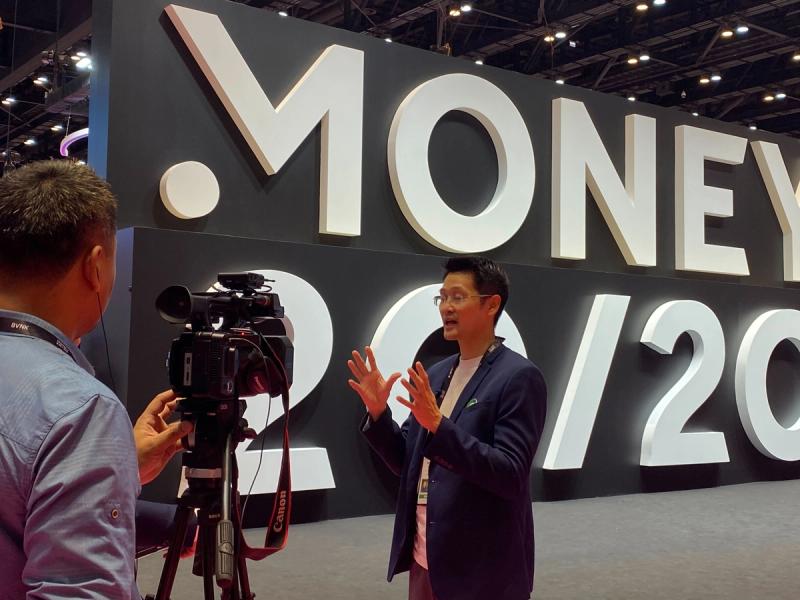When not discussing the power of a cloud-native approach to core banking at our booth, the Mambu team took the stage. There, we discussed how collaboration between financial institutions, fintechs and big tech is a differentiator in today’s fast-paced landscape.
From the burgeoning markets of Indonesia, Malaysia, the Philippines, and Vietnam to the well-established financial powerhouses of Singapore, Japan, Australia and more, there was much to learn and share about Asia-Pacific’s fintech climate.
Now we take the opportunity to reflect on the conversations we had on the conference floor and the press lounge, and the takeaways from a world-class line-up of panellists and speakers - including our very own Omar Paul, SVP Product and Engineering, and Woratep Yunyongkul, our Country Manager, Thailand, who presented with our customers Bank Aladin and MoneyDD and our partners AWS and GCP.
They shared insightful contributions about how technology is bringing opportunities to the market and the trends emerging in finance in the year to come. Here are their takeaways:

Consumers in Thailand, especially younger demographics, are increasingly embracing digital lending processes, driven by their familiarity with technology and preference for seamless online experiences. This shift aligns with Thailand's advancements in the mobility space and the broader trend toward digitalisation.
To effectively drive new lending models and technologies, we are seeing a rise in the use of cloud technology among traditional and new lending players in Thailand. The cloud offers several advantages that enable lenders to move faster than traditional lenders on legacy core systems.
Running on a composable banking architecture is a game-changer as it enables the use of the best-in-class technologies via APIs, so financial institutions can offer modern lending and banking experiences that today’s consumers expect.
To encourage adoption of new technology, an understanding of the nuances of Thai culture and societal context is vital. For instance, there is still a lack of digital adoption among Thais especially in rural areas and more senior demographics. Additionally, digital lending involves no face-to-face interactions, which requires some education to encourage a change and highlight the benefits of the new approach.
By demonstrating the power of digital lending, for instance, removing the need to travel into a bank branch to apply for a loan or make a payment, both borrow and lender can benefit from enhanced efficiency, speed-to-market, and accessibility.
Another point of discussion was the regulatory environment in Thailand, which is adapting to the changing lending landscape, with the Bank of Thailand implementing measures to ease lending norms and promote responsible lending. Collaborations between fintech companies, traditional banks, and regulatory bodies are crucial for the evolution of lending practices, facilitating innovation while ensuring adherence to regulatory standards.

What we think about the world will determine the choices we make with our money. This is true for consumers of any, or no, religious background; in Islam, however, the interaction of belief and business takes on a specific form in the shape of Islamic banking.
This comes at a time where consumer expectations have risen as technology becomes intrinsic to our lives and service standards increase across industries. We conducted a global survey of millennial and Gen Z consumers in the Muslim community in Malaysia, Indonesia, the UAE, Saudi Arabia, UK and South Africa to assess the current shape of Islamic finance and explore what this means for the banking industry as a whole.
We found that a large majority (93%) of respondents say it is important to be able to access their bank anywhere, any time (up from 80% in our 2021 survey). An additional 78% say it is important they can make an investment without seeing someone in person (up from 70% in 2021).
For financial institutions to meet today’s consumer expectations, it’s vital they offer Shariah-compliant financial solutions in a way that is digitally-enabled. The challenge for many banks is they operate on legacy core systems, which hold them back from building innovative products and services with ease and a time-to-market that matches today’s pace of change. Constrained by outdated technology foundations, offering the services that consumers need and expect is a challenge.
This presents an opportunity for banks to team up with fintechs and tech to modernise their systems to streamline processes and stay competitive. By addressing these factors and through collaboration, the Islamic financial sector can continue to evolve and promote ethical, sustainable, and innovative financial practices.

Find out how we are enabling our customers, which include banks - both neo and established - lenders, fintechs, building societies and more to enable better long-term business outcomes by operating on a modern core system.
Get in touch
